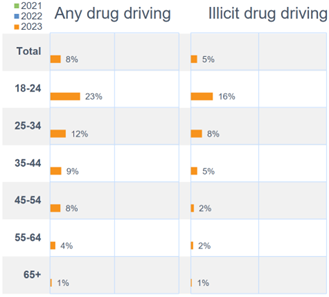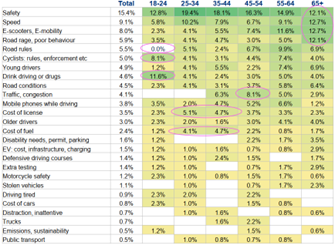RACQ study reveals high drug use among young drivers

Head of Public Policy Dr Michael Kane said the 2023 Annual Road Safety Survey was the first time the Club had asked Queensland drivers about their drug use, and the results revealed how big an issue it is.
“These results are extremely concerning and have exposed the prevalence of drug driving, particularly among our youngest and most inexperienced drivers,” Dr Kane said.
“Considering every fifth fatality (20.5%) on Queensland roads in 2022 involved a drug driver, we need these motorists to wake up to themselves and not put their life, or the lives of others at risk. No driver can say they didn’t know it was illegal to drink or drug drive.
“Between 2018 and 2022, 280 people died in road crashes involving a drink driver and 267 died in crashes involving a drug driver*. Drug driving fatalities are on the rise and are now just as big of an issue as drink driving.
“Our study also showed ‘drink driving or drugs’ was the second most important motoring topic for 18 to 24-year-olds, which highlights the relevance of this issue.”
As drivers aged, the prevalence of drug driving dropped but was still shockingly high with 8% of 25 to 34-year-olds and 5% of 35 to 44-year-olds admitting to the dangerous and illegal behaviour.
RACQ supports the State Government’s commitment to develop a package of drug driving reforms as part of its Queensland Road Safety Action Plan 2022-2024 and is calling for mandatory saliva tests after a crash.
“We believe the Queensland Government should investigate the possible introduction of compulsory roadside illicit drug saliva testing following crashes. This would improve data on the issue and increase the chance of drug drivers being caught.”
Dr Kane said it’s not just driving under the influence of illicit drugs that can be dangerous with 8% of Queenslanders saying they’ve taken either prescription or non-prescription drugs before getting behind the wheel.
“Some prescription and over-the-counter drugs can affect your vision, mood, decision-making skills, muscles, and coordination and therefore impair your ability to drive,” he said.
“We urge people to stop driving and speak to their doctor if they notice their medication is impairing their driving and ask their doctor or pharmacist about the possible effects of any new medications.”
RACQ will continue to work with its members and the State Government to address the dangerous issue of drug driving.
Percentage of Queensland drivers who admitted to driving under the influence of drugs^:

Motoring topics that are important to Queensland Drivers^:

*Source: TMR QLD Road Crash Weekly Report
^Source: RACQ’s Annual Road Safety Survey 2023
Related topics
Things to note
The information in this article has been prepared for general information purposes only and is not intended as legal advice or specific advice to any particular person. Any advice contained in the document is general advice, not intended as legal advice or professional advice and does not take into account any person’s particular circumstances. Before acting on anything based on this advice you should consider its appropriateness to you, having regard to your objectives and needs.
Insurance Products (excluding Travel Insurance) are issued by RACQ Insurance Limited ABN 50 009 704 152 (RACQI) and arranged by its agent, RACQ Distribution Services Pty Ltd (RDS) ABN 35 116 361 650, AFSL 567130 and RDS' authorised representatives (including RACQ Operations Pty Ltd ABN 80 009 663 414, AR No. 234978 (RACQO). Conditions, limits and exclusions apply. RDS and RACQO are in the RACQ group of companies. One of the companies in the RACQ group of companies has a minority shareholding in RACQI.
RDS and RACQO have not taken your personal objectives, circumstances or needs into account when preparing advice regarding insurance products and you will need to consider whether the advice is appropriate for you. Read the Product Disclosure Statement (PDS) and any applicable Supplementary PDS before making a purchase decision on this product. You can also access our Target Market Determinations on this website. RDS receives a commission from RACQI for the policies it arranges. RACQO receives fees paid for services it provides to RDS. Further details about remuneration are available on request prior to purchasing.
Banking and loan products issued by Members Banking Group Limited ABN 83 087 651 054 AFSL/Australian credit licence 241195 trading as RACQ Bank. Terms, conditions, fees, charges and lending policies apply. This is general advice only and may not be right for you. This information does not take your personal objectives, circumstances or needs into account. Read the disclosure documents for your selected product or service, including the Financial Services Guide and the Terms and Conditions, and consider if appropriate for you before deciding.
Except for RACQ Bank, any RACQ entity referred to on this page is not an authorised deposit-taking institution for the purposes of the Banking Act 1959 (Cth). That entity’s obligations do not represent deposits or other liabilities of RACQ Bank. RACQ Bank does not guarantee or otherwise provide assurance in respect of the obligations of that entity, unless noted otherwise.
RACQ Bank subscribes to the Customer Owned Banking Code of Practice which establishes higher standards than the law requires. The Code reflects modern consumer expectations and developments in approaches to issues such as consumer vulnerability, guarantors, and supporting customers through financial hardship. Please read our Customer Owned Banking Code of Practice page for more information.
RACQ Operations Pty Ltd (ABN 80 009 663 414 AR 000234978) and Members Travel Group Pty Ltd (ABN 45 144 538 803 AR 000432492) are acting as an Authorised Representative of the issuer of the insurance, Tokio Marine & Nichido Fire Insurance Co., Ltd. (ABN 80 000 438 291 AFSL 246 548). Any advice set out above is general in nature only, and does not take into account your objectives, financial situation or needs. Before purchasing any travel products, please consider the RACQ Travel Insurance Product Disclosure Statement (PDS) and the Target Market Determinations (TMDs) that apply to these products. Whilst the PDS outlines the Terms and Conditions of these products, the TMDs outline the intended class of customers that comprise the target market for these travel products. This will allow you to consider which products best suit your objectives, financial situation and needs and consider the products appropriateness to your personal circumstances. TMDs also outline matters involving the distribution and the review of these products. The PDS, Supplementary PDS and TMDs for each travel product can be found here.

